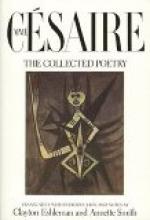|
This section contains 4,266 words (approx. 15 pages at 300 words per page) |

|
SOURCE: Smith, Robert P., Jr., and Robert J. Hudson. “Evoking Caliban: Césaire's Response to Shakespeare.” CLA Journal 35, no. 4 (June 1992): 387-99.
In the following essay, Smith and Hudson view Césaire's Caliban from A Tempest to be “a trickster and a shrewd impatient slave who refuses to submit and who wants freedom without delay, like the militant black hero who rejects the language, the name given to him, and the philosophy of servility of the unwanted master.”
As long as this universe is plagued by imperialism, tyranny, genocide, slavery, inhumanity, hypocrisy, and the rest, someone will continue to cite, in support of or justification for his or her cause, the myth or recurring theme of Caliban. Caliban, for Shakespeare, is the naturally grotesque, vulgar, and brutish slave, far from the noble savage of Montaigne or of the literature of romanticism. In fact, in The Tempest—performed as early...
|
This section contains 4,266 words (approx. 15 pages at 300 words per page) |

|


